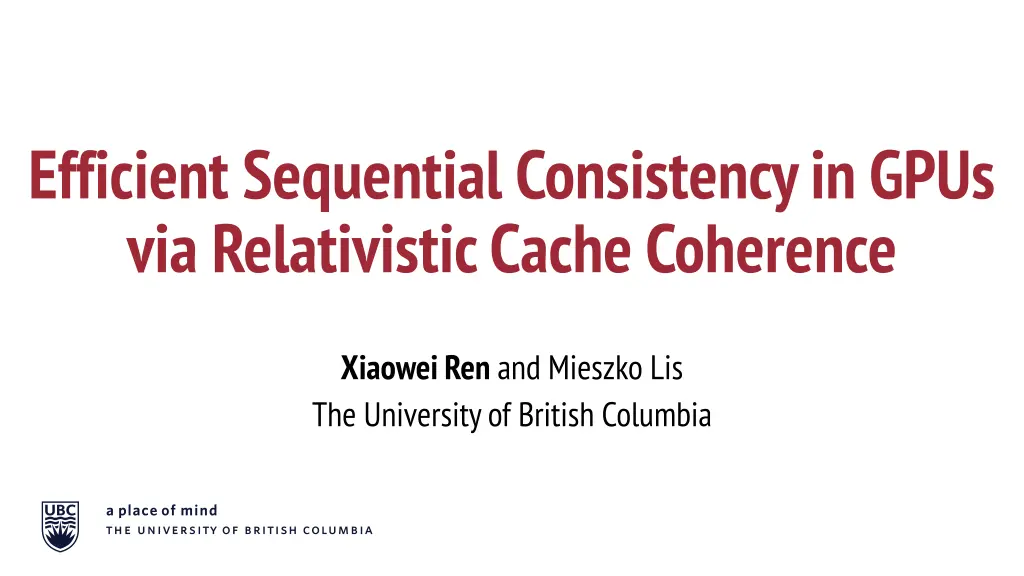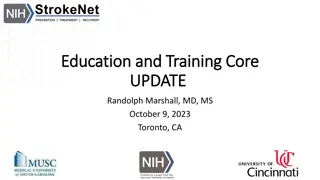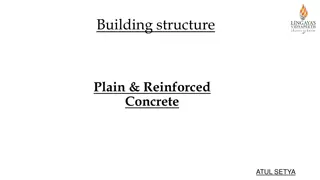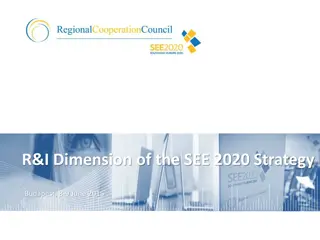
Efficient Sequential Consistency in GPUs via Relativistic Cache Coherence
Explore efficient strategies for achieving sequential consistency in GPUs through relativistic cache coherence, minimizing performance gaps and proposing solutions to enhance cache protocols and core microarchitecture.
Uploaded on | 0 Views
Download Presentation

Please find below an Image/Link to download the presentation.
The content on the website is provided AS IS for your information and personal use only. It may not be sold, licensed, or shared on other websites without obtaining consent from the author. If you encounter any issues during the download, it is possible that the publisher has removed the file from their server.
You are allowed to download the files provided on this website for personal or commercial use, subject to the condition that they are used lawfully. All files are the property of their respective owners.
The content on the website is provided AS IS for your information and personal use only. It may not be sold, licensed, or shared on other websites without obtaining consent from the author.
E N D
Presentation Transcript
Efficient Sequential Consistency in GPUs via Relativistic Cache Coherence Xiaowei Ren and Mieszko Lis The University of British Columbia
Contributions : GPU Sequential Consistency GPU Best Relaxed Consistency Performance Gap: from 28% to 7% Two Possible Solutions : Change Core Microarchitecture Improve Cache Coherence Protocol 2
Cost of SC : store stalls A valid in $ C0 ld A sync through Invalidation messages dir time C1 execution continues st A - longer latency Idealized MESI (no latency for inv-ack): 1.6x faster 3
Cost of SC in Temporal Coherence Problem A valid in $ until t=100 ld A C0 sync through shared clock ld A(hit) 100 dir time C1 st A execution continues + no write stalls + can support SC wait until lease expires cannot support SC TC: 88% faster than MESI TC-SC: 28% slower than TC 4 Shim et al. Library Cache Coherence. MIT CSAIL TR 2011-027, 2011. Singh et al. Cache Coherence for GPU Architectures. In HPCA 2013.
Removing SC Stalls : RCC A is invalidated after clock advancement A valid until C0 s now=10 ld A B valid until C0 s now=25 Assume B was written @ 15 ld B C0 ld A(hit) sync through distributed logical clocks now=0 now=0 now=0 now=15 now=0 Earliest timestamp later than 10 dir physical time now=11 now=11 now=0 now=0 now=11 C1 st A ld A + no write stalls new A valid until C1 s now=21 Store: advance clock of writing core to the logical time store should happen Load: advance clock of reading core to the logical time data were written 5
Distributed Logical-clocks in CPUs ? CPU : latency-critical GPU : throughput-oriented, latency-tolerant GPU : private $ write-through shared $ write-back CPU : private $ write-back shared $ write-back CPU* Yes Yes Yes Yes Complex GPU No No No No Simple need speculation ? downgrade ? invalidation message ? recall message ? implementation ? 6 Lamport. Time, Clocks, and the Ordering of Events in a Distributed System. Comm. ACM, 21:558 565, 1978. *Yu & Devadas. TARDIS: Timestamp-based Coherence Algorithm for Distributed Shared Memory. In PACT 2015.
Simple Implementation core state now now, ver and exp are 32-bit. v v v v tag tag tag tag data data data data exp exp exp exp L1$ state Area Overhead : 3% for L1 $ 6% for L2 $ v d v d v d v d v d v d tag tag tag tag tag tag data data data data data data ver ver ver ver ver ver exp exp exp exp exp exp L2$ state 7
Simple Implementation MESI 16 81 15 50 TC-SC 5 27 8 23 TC 5 42 8 34 RCC 5 33 4 14 L1 states L1 transitions L2 states L2 transitions 8
Stall cost improved? 1.0 0.8 0.6 52% less than MESI 0.4 25% less than TC-SC 0.2 0.0 TC-SC MESI RCC Stalls caused by SC 9
Overall Performance 2.0 1.25 inter-workgroup sharing (left): 1.0 1.5 76% faster than MESI 0.75 1.0 29% faster than TC-SC 0.5 intra-workgroup sharing (right): 10% faster than MESI 0.5 0.25 0.0 0.0 3% faster than TC-SC TC-SC MESI RCC TC-SC MESI RCC 10
So, cost of full SC support in GPUs? 1.25 1.25 1.0 1.0 Inter-Workgroup Sharing (left): 7% slower than TC 0.75 0.75 0.5 0.5 Intra-Workgroup Sharing (right): 3% slower than TC 0.25 0.25 0.0 0.0 TC RCC TC RCC 11
Summary Main source of SC inefficiency : stalls for write permission acquisition. Resolve SC stalls with distributed logical clocks. RCC is 29% better than TC-SC, which is the best SC model so far. RCC shortens the performance gap between SC and the best RC within 7%. Questions? 12






